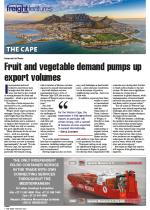When Transnet National Ports Authority (TNPA) staff gaze out of the windows of their new offices and see equipment in the Port of Ngqura standing idle while Durban is losing volumes to other ports in the region due to congestion and inefficiency, the penny has to (finally) drop – here is what in corporate speak is called an “underutilised asset”.That, anyway, is the hope of the Nelson Mandela Bay business community.The news that TNPA is moving its headquarters from Durban and Gauteng to Port Elizabeth has been cautiously welcomed by local business leaders, the Nelson Mandela Bay Business Chamber and the National African Chamber of Commerce.Cautious, because they have had promises from Transnet repeatedly broken.These include the upgrade of the East London port, the moving of the manganese and fuel dumps from Port Elizabeth to Ngqura, and the upgrading of the railway line into the metro.What may be in the metro’s favour is that Transnet National Ports Authority (TNPA) chief executive Pepi Silinga was head of the Coega Development Corporation (CDC) for around two decades and knows the frustrations of dealing with Transnet at a distance. In a statement issued on his behalf he emphasises the economic benefit to the region: “Transnet sees the consolidation of TNPA in the EC as an important contributor to the revival of that province’s economy, as it increases the ease of doing business.”Silinga cites the success of the recent citrus season, where Port Elizabeth was temporarily changed from being a port-wide manganese terminal back to its container roots.Two mobile ship-to-shore gantries were delivered to the port ahead of the citrus season to augment the existing operational cranes in the harbour. In its response to the news, the CDC issued a statement: “We see this decision of the TNPA as showing the commitment to be closer to clients, ensure unblocking of projects, and also facilitate further the competitiveness of ports.”CDC spokesperson Ayanda Vilakazi added that the relocation would “unlock opportunities in the (Eastern Cape) coastal regions, further realising the country’s strategy on the oceans economy”.

